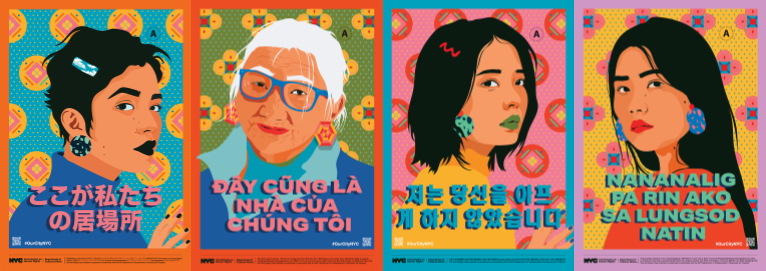
March 17, 2021
Dear Yu Ming Community,
Yesterday our country witnessed another act of senseless racist violence. Eight people were murdered in Georgia; six of them Asian women. We mourn the loss of these lives and are heartbroken for their families. We know only four of their names so far: Xiaojie Yan, Daoyou Feng, Ashley Yuan, Paul Andre Michels. Let us not forget them or their stories.
Our Asian American and Pacific Islander (AAPI) communities continue to grieve and hurt. Violence against AAPI is not new in the U.S., but with the increase of hate speech and dehumanizing rhetoric connected to the pandemic, we have witnessed an alarming rise in acts of hate and violence especially against elders, women, and the most vulnerable in our communities.
The majority of Yu Ming’s community of students, staff, and families are BIPOC (Black, Indigenous, People of Color) and the majority of our BIPOC community identifies as Asian. We are all grieving and hurting. We also know that all who care about racial equity are also grieving and hurting, as are many in our community who continue to bear the pain and trauma of generations of racial violence and hate.
Two weeks ago I shared reflections with our Yu Ming staff after our “Lantern Festival and Dragons for Black Lives” car caravan. Here is an excerpt:
Saturday’s event was a beautiful and important action to speak out against the anti-Asian violence that has impacted Asian Americans since the start of the pandemic creating fear and suffering on top of the suffering that has been caused by the virus itself. It was also an opportunity for our Yu Ming voices to be heard in not only acknowledging the pain and suffering but also declaring loudly that we as a community stand for love over hate. Liberation over oppression.
In the past month alone, there have been many assaults on Asian Americans and Asian elders in Oakland, San Francisco, New York City and across the county. These are just the latest in a string of hundreds of racist attacks targeting Asian Americans. Anti-Asian racism, unfortunately, is not new to our country. It’s something that has been felt by many of you, and something that I have personally experienced since arriving in the U.S. as a little girl and continue to experience even with U.S. citizenship, English fluency, and working as a U.S. public education advocate for most of my life. And despite all my years in this country, and for some of you multiple generations in this country, we are still cast as Ronald Takaki’s book title aptly named “Strangers From A Different Shore.”
Systemic racism is still very much circulating in our country and one of its most terrible tools – that of dehumanization and othering – continues. This was sanctioned and normalized even from the White House. And the highest elected official in the U.S. encouraged some of the worst hatred, some of the worst discrimination, the worst language, and added his voice to a centuries long normalization of racism and dehumanization of Asian communities.
And not only Asian communities, but immigrant, Muslim, non-Christian, transgender, female, Indigenous, LatinX, and Black communities. Many of us, and our brothers and sisters, have suffered in silence and felt that our suffering was invisible and unseen.
What Saturday was about was saying we are more than our pain, we are more than our oppression, we reject and speak out against the hate crimes, the assaults on our bodies, the white supremacist systems that spread the lie that we are the cause of each other’s suffering. We came together and said there is no place for hate in our community and in our world. We came together to proclaim loudly and clearly – together – what Martin Luther King Jr reminded us that, “No one is free, until we are all free.”
We want to create a different story and a different world, remembering and honoring our elders and ancestors, a world where we deeply examine ourselves and our identities, deeply listen and inhabit with empathy the stories of others, and build a strong interconnected community, a global community.
I know that many of us became educators and chose to work in schools and with children because we so deeply believe this is possible and you make this happen every day with your small and big moments with the children we work so hard to make feel safe and loved and affirmed.
And in doing this work, we also still grapple with so much. We continue to explore our own identities and our connection to this country both good and bad, and our connection to race and racism, privilege and oppression, and what that means for the work we all care so deeply about.
Sharing our stories is a vehicle to healing and liberation. We can not remain silent. Let us use this moment to speak out, proclaim our humanity, and demand an end to hate, misogyny, and racism in all its forms. Let us use this moment to deepen our awareness and act.
We are a cross-cultural community nurturing in our students and adults the values of collective care by deeply connecting to one another in our Compass circles, learning one another’s stories and histories, leading mutual aid campaigns, and speaking up for love and against hate in our solidarity rallies.
Yu Ming exists to expand opportunity and nurture global scholars who will use their education to change our world for the better. It is because of them that I have hope.
Stronger together,
Sue Park
Head of School

“I Still Believe in Our City” is a public awareness campaign by multidisciplinary artist Amanda Phingbodhipakkiya. The public awareness campaign was developed with the NYC Commission on Human Rights to combat anti-Asian discrimination, harassment, and bias as a result of COVID-19, and launched with the support of the NYC Department of Cultural Affairs. The “I Still Believe in Our City” campaign has graphics available to address anti-Asian racism and harassment here.
